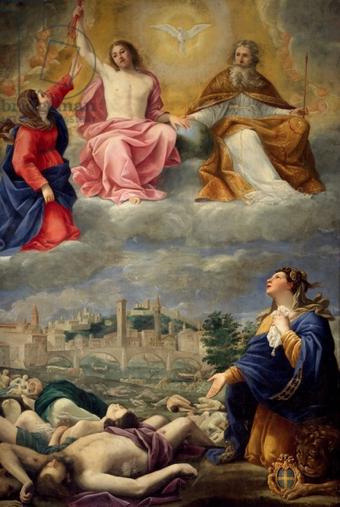感染症と心理
疫病の蔓延がなぜ起きるのか?どうすれば終わるのか?それらがわからないので、人は不安や恐怖という感情を引き起こす。それに対して、預言者は「なぜ」を説明し、僧侶は儀式を通して「終わらせる」。その流れで人心の安寧は実現できるかもしれない。
疫病の蔓延がなぜ起きるのか?どうすれば終わるのか?それらがわからないので、人は不安や恐怖という感情を引き起こす。それに対して、預言者は「なぜ」を説明し、僧侶は儀式を通して「終わらせる」。その流れで人心の安寧は実現できるかもしれない。
Ritual response to plagues (疫病への儀式的対応)あるいは、災厄に意味を見出すことで、安心感を得たり、不条理感を和らげたりする。
The Bible seldom mentions doctors, but various religious experts including prophets and priests provide responses to the illnesses. Prophets were considered instrumental in conveying godly messages to people
In a situation of crisis, they explained why God was upset. For instance, prophet Jeremiah warns King Zedekiah that all the inhabitants of Jerusalem will die by the sword, famine and pestilence due to the Israelites’ transgressions.
Whereas prophets delivered godly messages, and helped to uncover the reason of illness, priests communicated with God through rituals. If the cause of illness was God’s anger, only God could provide recovery from it. Therefore, one had to appease the anger.
Priests could do this by carrying out the right rituals.
聖書が医師に言及することはほとんどないが、預言者や僧侶など多様な宗教専門家が病気に対応することには言及している。おそらく、預言者は、神の言葉を人々に伝える道具と考えられていた。
危機の状況下では、彼らは神がなぜ怒っているのか説明した。たとえば、預言者エレミアはゼデキア王に、イスラエル人の宗教的罪のために、刃と飢餓と疫病によってエルサレムの住人がすべて死ぬことになると警告した。
預言者は神の言葉を伝え、病気の理由を明らかにすることを手助けするが、僧侶は神と儀式を通して意思疎通する。疫病の理由が神の怒りであるなら、神のみが癒せる。したがって、誰かが怒りをなだめなければならない。
僧侶はこれを、正しい儀式を行うことで実現する。
[ Hanna Tervanotko (Assistant professor, Religious Studies, McMaster University) : "How the ancient Israelites dealt with epidemics — the Bible tells of prophecy and rituals" (2020/04/14) on The Conversation ]
Rituals offer comfort (儀式は癒しをもたらす)いずれも、妄想や幻影にすぎないが、人心への効果はリアルなもの。
In the Hebrew Bible it was often more important to address the cause of the disease through a ritual than finding a medical cure to it. One may not have control over their fate, but rituals offered some sense of security in the midst of catastrophes.
During COVID-19 many religious people have turned to their religious responses. Others have engaged with actions that that create connections and care. They do not directly address the pandemic, but nonetheless offer them emotional relief.
People have always searched for meaning in their misfortunes in difficult times. It can be comforting to believe that things happen for a reason and something can be learned in chaotic situations.
Moreover, different explanations allow people to create their own responses to cope with the unknown. Recognizing this human need to rationalize crisis helps us to understand various explanations that people continue to give for the pandemic.
ヘブライ語聖書では、医学的な治療法を見つけるよりも、儀式を通して病気の原因に取り組む方がしばしば重要だった。彼らの運命を制御できないかもしれないが、儀式は大災害の真っただ中に安心感を提供した。
COVID-19の期間中、多くの宗教的人々が宗教的反応に目を向けてきた。他の人たちは、つながりとケアを生み出す行動に関わっている。彼らはパンデミックに直接対処しているわけではないが、それでも感情的な救済を提供する。
人々は常に困難な時期に自分の不幸の意味を探し求めてきた。物事は何らかの理由によって起こり、何かを無秩序な状況から学ぶことができると信じることが慰めになる。
さらに、さまざまな説明により、人々は未知のものに対処するための独自の対応が可能だ。危機を合理化するために、このような反応をする必要性を認識することは、人々がパンデミックに対して与え続けているさまざまな説明を理解するのに役立つ。
[ Hanna Tervanotko (Assistant professor, Religious Studies, McMaster University) : "How the ancient Israelites dealt with epidemics — the Bible tells of prophecy and rituals" (2020/04/14) on The Conversation ]
[ Antonio Giarola, Verona Suppliant at the Feet of the Trinity, 1630, Verona San Fermo Maggiore, Chapel of the Conception ]



コメントをかく